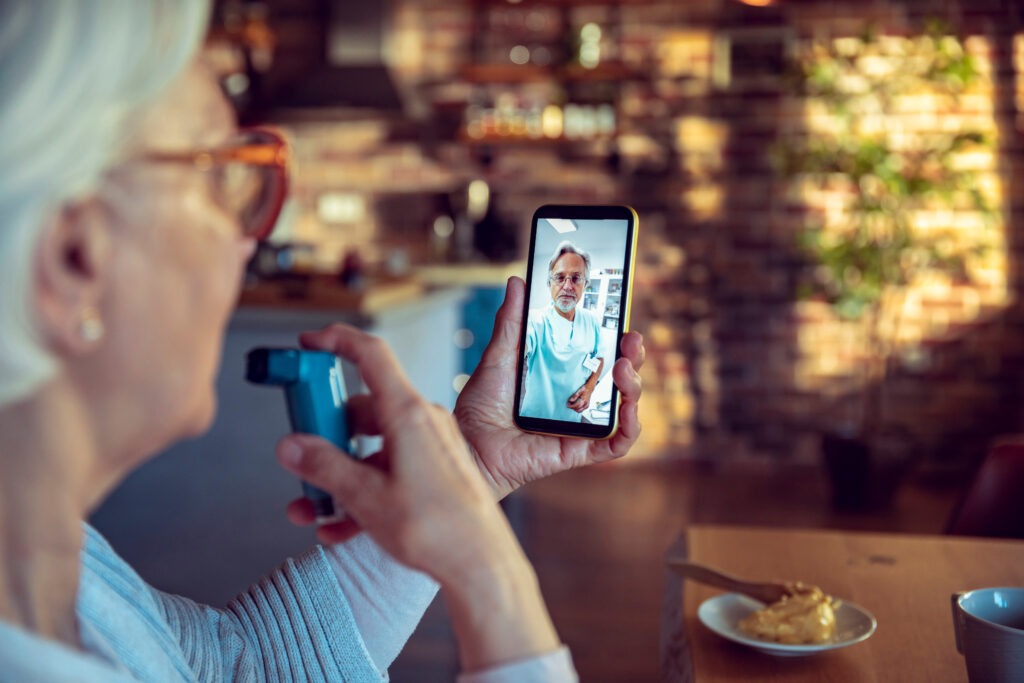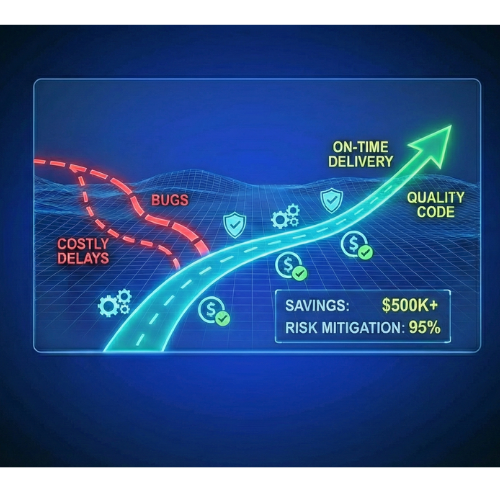Blog Summary:
- mHealth technology supports care delivery through mobile devices, enabling remote monitoring, communication, and education.
- Mobile tools improve provider workflows with real-time data analysis, EHR integration, and reduced hospital readmissions.
- Patients benefit from convenient remote consultations, chronic condition management, and personalized feedback.
- Custom telemedicine platforms, like those built by Digital Scientists, enhance access, engagement, and regulatory compliance.
- The future of mobile healthcare includes AI diagnostics, implantable monitoring devices, and advanced cloud-based analytics.
Mobile technology in healthcare, often referred to simply as “mHealth,” is an umbrella term that encompasses the use of mobile electronics such as smartphones, tablets, and even connected wearables to support various aspects of healthcare. These aspects may include communication, health education, patient monitoring, and health administration, among other things.
The World Health Organization defines mHealth more simply as “medical and public health practice supported by mobile devices,” including phones, personal digital assistants, wireless devices, and patient monitoring tech.
Clearly, there are many types of mHealth technologies out there. But what is the importance of mobile technology in healthcare, writ large, and where is the future of the industry headed?
Below, we’ll discuss the current impact, challenges, and potential future of mHealth.
The Importance and Benefits of Mobile Technology in Healthcare
Mobile healthcare technology is important precisely because it can facilitate the delivery of affordable, timely, and accessible care. Benefits don’t just extend to providers, either. They also often extend to patients, which improves the patient experience. That, in turn, reflects favorably on providers.
Mobile tech in healthcare enhances communication, decreases treatment delays, and supports remote access, which was especially crucial during the global COVID-19 pandemic, but also has far-reaching future implications.
Here are some specific advantages of mobile technology in healthcare:
- Enables remote patient monitoring.
- Improves medication adherence and chronic disease management.
- Makes real-time patient-provider communication possible.
- Provides access to educational resources and preventive care.
Out-of-the-Box vs. Custom mHealth Solutions
Demonstrating the benefits of mHealth tech, the Samsung Galaxy A15 Healthcare Edition seamlessly integrates mobile devices with SaaS platforms to collect, store, and transmit health data. This better enables clinicians to provide appropriate and timely interventions.
But you’re also not limited by existing tech, either. In fact, you’d likely benefit even more from the enhanced customization and personalization that accompany custom mobile healthcare technology solutions.
That’s why, at Digital Scientists, we build HIPAA-compliant telemedicine platforms that enable everything from real-time patient monitoring to video conferencing and AI-driven diagnostics. Not only do these systems improve access and outcomes, but they also support patient education, telesurgery, and remote mental health support, among other use cases.
How Does Mobile Technology Impact Healthcare?
Mobile technology transforms healthcare by offering unique benefits to both providers and patients. Digital mHealth tools streamline care delivery and lead to better health outcomes across the board.
Benefits to Providers
- Effortless integration with your Electronic Health Records (EHR).
- Real-time clinical data analysis that supports quick, informed decisions.
- Reduced hospital readmissions and lower operational costs.
- Streamlined telemedicine consultations and communication.
Benefits to Patients
- Seamlessly connects with your EHR for real-time data analysis and alerts.
- Offers convenient remote consultations and follow-ups with specialists, no matter where you are.
- Empowers patients with self-monitoring tools and educational content.
- Improves chronic condition management with personalized feedback and remote monitoring.
Integration of mobile-integrated therapies (MIT) into EHRs lets patient self-reported data be used for clinical decisions and long-term care planning.
Digital Scientists supports this evolution by creating interoperable mobile health solutions that streamline care delivery, integrate HL7 and 3rd-party APIs, and ensure HIPAA and GDPR compliance.
Our custom-built apps create a personalized digital health experience, giving patients the tools they need to effectively manage their chronic conditions. By leveraging AI and patient-centered design, these apps not only build trust but also give clinicians a clearer picture of patient behaviors and treatment progress, even outside of the clinic.
What’s the Future of Mobile Technology in Healthcare?
While no one has a crystal ball, the future of mHealth technology is likely to include:
- Faster, more accurate diagnoses with AI-driven support.
- Widespread use of implantable devices for remote patient monitoring.
- Smarter data analysis through enhanced cloud technology.
- Better mobile health apps for managing mental health, fitness, and chronic conditions.
Be Part of the Future of Healthcare Now
Mobile technology is revolutionizing healthcare by degree each and every day by enhancing access, engagement, and efficiency. Continued innovation, integration, and strategic deployment will help mobile health tools reshape patient care at the individual level and public health on a global scale.
Looking for tailored mHealth technology solutions and custom healthcare app development? Forward-thinking developers like ours here at Digital Scientists are already working on building the future of mobile technology in healthcare.
We offer mobile-first solutions that align with patient needs and provider workflows to ensure technology delivers on its promise of better care for all.
Proof of Concept: See how we helped CommuniCare Health Services develop a custom RPM platform to help older adults age in place.



